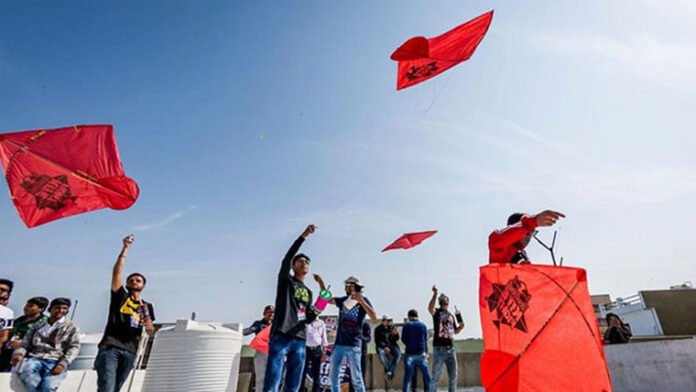Punjab’s Home Department adopted a strict standpoint against kite flying by amending the regulations and introducing harsher penalties. The government has labeled them kite-flying and producing. And moving as unbailable offenses after changing the Kite Flying Ban Act 2007. These measures are intended to address increasing concerns about public safety. Kites and associated dangerous materials have led to the loss of human lives through accidents.
Non-Bailable Offences for Kite-Related Activities
Among the new regulations is an outright ban on kite flying and the preparation, use, and transport of manjha—metal wire, thread, or string coated with glass particles—to increase the chances of cutting an opponent’s kite. The use of these materials poses significant risks to both persons and property. This could be seen from their move to make such offenses non-bailable due to the situation’s gravity and the Punjab Government’s wish for public security.
Strict Penalties for Violators Kite Flying
The Punjab Cabinet’s approved changes introduce the most brutal measures against those involved in kite-flying or related activities. Under these new rules, anybody caught flying metal cutters will serve up to three to five years in jail or pay fines of two million rupees. When an offender fails to raise money for acceptable payment, an additional one-year imprisonment shall be imposed upon him/her. This increased penalty was meant to deter continuing involvement in this life-threatening activity.
Even more severe penalties are specified under this law for those who engage in kite manufacturing or transportation. Such individuals may be imprisoned for 5-7 years or fined up to 5 million rupees per the new legislation, or both punishments can be applied simultaneously. Otherwise, they will spend another term lasting only two years if they cannot pay the provided acceptable amounts. Through the imposition of such hefty punishments, the government demonstrates its intolerance of any kite-related activities, especially those that are life-threatening.
Special Provisions for Juvenile Offenders Kite Flying
The new regulations have also established specific provisions for juveniles found flying kites. For a first-time offender, the child will be given a warning. However, if caught on a second occasion, they shall pay a fine of 50,000 rupees. In case of a third violation, this sum rises to 100,000 rupees. Where the child cannot pay fines, the amounts will be recovered from their parents or guardians.
If such an offender commits a fourth offense, more severe actions occur. Such a level of punishment may include imprisonment as per the Juvenile Justice System Act (2018). They were designed to reduce recurring offenses and hold accountable guardians concerning acts done by their children.
Addressing the Public Safety Concern Kite Flying
The Punjab Government’s amendment of the Kite Flying Ban Act was driven by a desire to save human lives from aspects associated with kite flying. This is because numerous accidents involving kites and sharp strings used in controlling them have been reported over the years. Many such incidents happen during popular kite-flying festivals when people are highly engaged. The government aims to discourage citizens from indulging in such dangeroinractices through more onerous penalties and non-bailable status regarding these offenses at all toffencesonclusion
Higher fines and long jail terms are expected to deter people from flying kites and protect them from harm. The government’s action shows how committed it is to fighting this lethal game to save the lives of its people. These new amendments remind citizens about the dangers of kite flying and why they need to obey laws. By strictly implementing these rules, the Punjab Home Department wants to eliminate the menace of kite flying to make a safer place for all its citizens.


